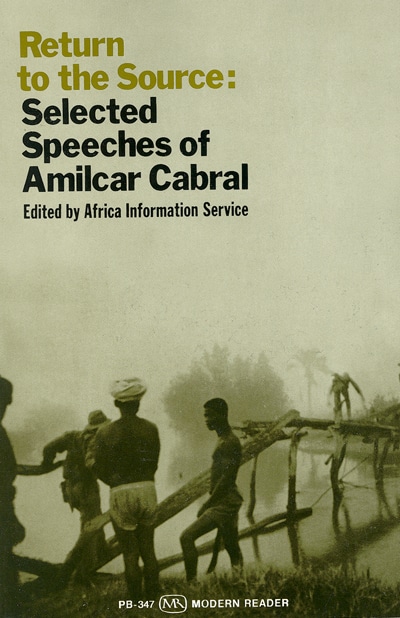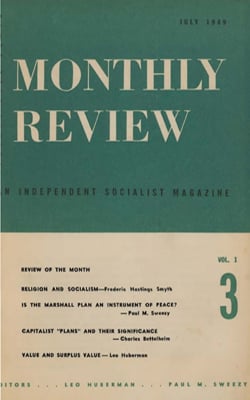Return to the Source
$15.00
Return to the Source: Selected Texts of Amilcar Cabral, New Expanded Edition
Coming soon! April, 2023
“For us,” said Amilcar Cabral, “freedom is an act of culture”—and these were not just words. Guided by the concrete realities of his people, Cabral called for a process of “re-Africanization,” a Return to the Source, to African ways of thinking, being and acting. As a new imperialism has taken hold the world over, many have hearkened back to Return to the Source, but this time, our source of inspiration is Cabral himself. With a system of thought rooted in an African reading of Marx, Cabral was a deep-thinking revolutionary who applied the principles of decolonization as a dialectic task, and in so doing became one of the world’s most profoundly influential and effective theoreticians of anti–imperialist struggle. Cabral and his fellow Pan-African movement leaders catalyzed and fortified a militant wave of liberation struggles beginning in Angola, moving through Cabral’s homelands of Guinea Bissau and Cape Verde, and culminating in Mozambique and beyond. He translated abstract theories into agile praxis and in under just ten years steered the liberation of three–quarters of the countryside of Guinea Bissau from Portuguese colonial domination.
In this new, expanded edition of Return to the Source: Selected Texts of Amilcar Cabral we have access to Cabral’s warm and humorous informal address to the Africa Information Service, and we revisit several of the principal speeches Cabral delivered during visits to the United States in the final years before his assassination in 1973, including his last written address to his people on New Year’s Eve. Return to the Source is essential reading for all who understand that the erasure of historical continuity between social movements has disrupted our ability to make the revolutionary transformation we all desperately require.
BIOS:
Amilcar Cabral (1924-1973) was a Pan-African freedom fighter and anti-imperialist theorist, best known for bringing the Portuguese empire to its knees. He was born in the Guinea Bissau town of Bafatá, to Cape Verdean parents of divergent classes, living under Portuguese colonial dominion. During a restive period in the development of African nationalist movements, he studied agronomy in Portugal alongside other African colonial subjects who joined together to form student movements dedicated to opposing the ruling dictatorship of Portugal and promoting the cause of independence for all Portuguese colonies in Africa. Upon his return to Africa in the 1950s, he managed, in under a decade, to steer Guinea Bissau towards near total independence. On January 20, 1973, Portuguese agents assassinated Cabral, but his murder did not deter his people from unilaterally declaring independence just eight months later. In life and death, he became an inspiration to revolutionary socialists and national independence movements worldwide.
Tsenay Serequeberhan is a Professor of Philosophy at Morgan State University in Baltimore. He is the author of the groundbreaking work The Hermeneutics of African Philosophy: Horizon and Discourse and the key text, African Philosophy: The Essential Readings, among other books.
Currently available: Return to the Source: Selected Speeches of Amilcar Cabral
Amilcar Cabral, who was the Secretary–General of the African Party for the Independence of Guinea and the Cape Verde Islands (PAIGC), was assassinated by Portuguese agents on January 20, 1973. Under his leadership, the PAIGC liberated three–quarters of the countryside of Guinea in less than ten years of revolutionary struggle. Cabral distinguished himself among modern revolutionaries by the long and careful preparation, both theoretical and practical, which he undertook before launching the revolutionary struggle, and, in the course of the preparation, became one of the world’s outstanding theoreticians of anti–imperialist struggle.
This volume contains some of the principal speeches Cabral delivered in his last years during visits to the United States. The first is his speech to the fourth Commission of the United Nations General Assembly on October 16, 1972, on “Questions of Territories Under Portuguese Administration.” His brilliant speeches on “National Liberation and Culture” (1970) and “Identity and Dignity in the Context of the National Liberation Struggle” (1972) follow.
During his last visit to the United States, Cabral asked the Africa Information Service to organize an informal gathering of representatives from a variety of black organizations, and it took place on October 20, 1972. The vitality, warmth, and humor with which Cabral spoke to the gathering are evident in the transcript which appears here, and which includes his replies to questions as well as his opening remarks.
Finally, the New Year’s Message of January 1973 is included. As his last written statement to the people of Guinea and the Cape Verde Islands, this constitutes the political testament of Amilcar Cabral. Included as well are maps, photographs, and suggestions for further reading bearing on the struggles of the PAIGC and of the liberation movements in Angola and Mozambique.Amilcar Cabral, who was the Secretary–General of the African Party for the Independence of Guinea and the Cape Verde Islands (PAIGC), was assassinated by Portuguese agents on January 20, 1973. Under his leadership, the PAIGC liberated three–quarters of the countryside of Guinea in less than ten years of revolutionary struggle. Cabral distinguished himself among modern revolutionaries by the long and careful preparation, both theoretical and practical, which he undertook before launching the revolutionary struggle, and, in the course of the preparation, became one of the world’s outstanding theoreticians of anti–imperialist struggle.
Publication Date: January 1973
Number of Pages: 110
Paperback ISBN: 9780853453451
Related products
-
Monthly Review Volume 2, Number 8 (December 1950) [PDF]
$10.00 Add to cart -
Monthly Review Volume 2, Number 4 (August 1950) [PDF]
$10.00 Add to cart -
Monthly Review Volume 1, Number 9 (January 1950) [PDF]
$10.00 Add to cart -
Monthly Review Volume 1, Number 6 (October 1949) [PDF]
$10.00 Add to cart -
Monthly Review Volume 1, Number 3 (July 1949) [PDF]
$10.00 Add to cart -
Monthly Review Volume 1, Number 2 (June 1949) [PDF]
$10.00 Add to cart

 [PDF].jpg)
 [PDF].jpg)
 [PDF].jpg)
 [PDF].jpg)

 [PDF].jpg)